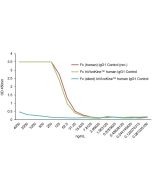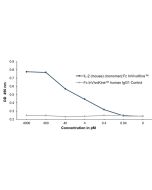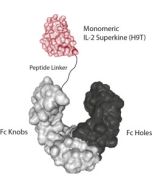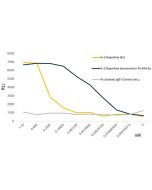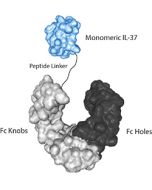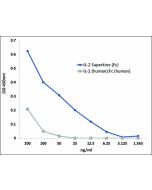Cookie Policy: This site uses cookies to improve your experience. You can find out more about our use of cookies in our Privacy Policy. By continuing to browse this site you agree to our use of cookies.
AdipoGen Life Sciences
IL-2 (mouse) (monomer):Fc (silent) InVivoKine™
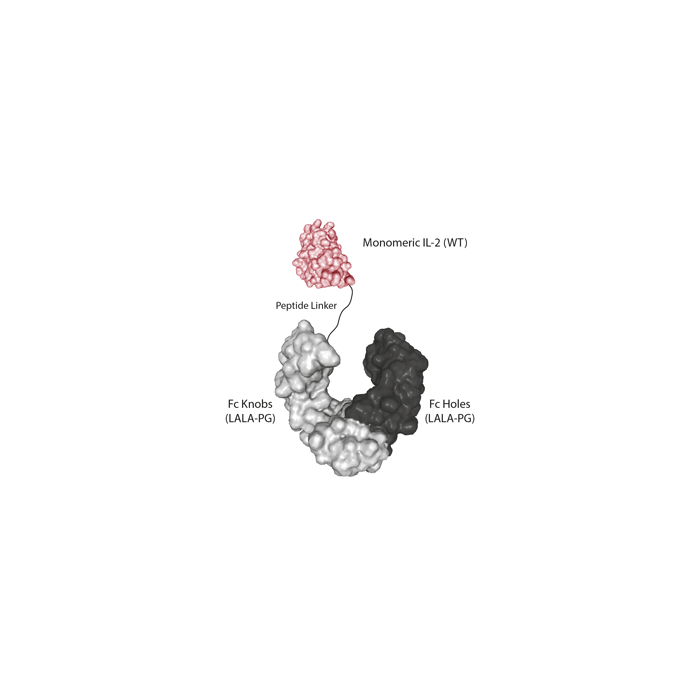
| Product Details | |
|---|---|
| Synonyms | IL-2 (mouse) (monomer):Fc (LALA-PG) KIH (human) (rec.); Interleukin-2; T Cell Growth Factor; TCGF; Aldesleukin; Super-2 |
| Product Type | Protein |
| Properties | |
| Source/Host | HEK 293 cells. Produced using animal component-free medium. |
| Sequence |
Mouse IL-2 (aa 21-169) is fused at the C-terminus to the Fc portion of human IgG1 (LALA-PG) (Knobs-into-Holes technology) (see reference: J.B. Ridgway, et al.; Protein Eng. 9, 617 (1996)). |
| Crossreactivity |
Human Mouse |
| Specificity |
The Fc contains the mutations LALA-PG that abolish the interaction between the Fc and FcγRs and therefore Fc undesirable effects. The Fc (LALA-PG) is named Fc (silent). |
| Biological Activity |
Increases proliferation of CTLL-2 mouse cytotoxic T cells with an ED50 of 5-20 pM (~0.54 to 2 ng/ml). |
| MW | ~50kDa and 28kDa (SDS-PAGE) |
| Purity | ≥95% (SDS-PAGE) |
| Endotoxin Content | <0.001EU/μg protein (LAL test). |
| Concentration | After reconstitution: 1mg/ml |
| Reconstitution | Reconstitute with 50μl endotoxin-free water. |
| Accession Number | P04351 |
| Formulation | Lyophilized. Contains PBS. |
| Protein Negative Control |
Fc (silent) InVivoKine™ (human) IgG1 Control (Prod. No. AG-35B-0018) |
| Other Product Data |
UNIPROT link P04351: IL-2 (mouse) |
| Shipping and Handling | |
| Shipping | BLUE ICE |
| Short Term Storage | +4°C |
| Long Term Storage | -20°C |
| Handling Advice |
After reconstitution, prepare aliquots and store at -20°C. Avoid freeze/thaw cycles. Centrifuge lyophilized vial before opening and reconstitution. PBS containing at least 0.1% BSA should be used for further dilutions. |
| Use/Stability |
Stable for at least 6 months after receipt when stored at -20°C. Working aliquots are stable for up to 3 months when stored at -20°C. |
| Documents | |
| MSDS |
 Download PDF Download PDF |
| Product Specification Sheet | |
| Datasheet |
 Download PDF Download PDF |
Interleukin-2 (IL-2) is a 133 amino acid glycoprotein with one intramolecular disulfide bond and variable glycosylation. It is secreted by activated T cells and induces proliferation and maturation of activated T cells, natural killer cells and lymphokine activated killer cells. IL-2 also stimulates proliferation of antibody-producing B cells, activates neutrophils and induces mononuclear cells to secrete IFN-γ and TNF-α and -β. Moreover, studies have shown that IL-2 is required for activation-induced apoptosis, an important homeostatic mechanism in the immune system, which is involved in the maintenance of peripheral tolerance to self-antigens.
IL-2 promotes T cell proliferation and particularly naive T cells. IL-2 signaling on activated T cells is effected through a quaternary high-affinity receptor complex consisting of IL-2, IL-2Rα (CD25), IL-2Rβ and IL-2Rγ. Naive T cells are relatively insensitive to IL-2 as they only express small amounts of IL-2Rβ and IL-2Rγ. They only acquire sensitivity after CD25 expression, which captures the cytokine and presents it to the IL-2Rβ and IL-2Rγ receptors. IL-2 is used in the treatment of metastatic cancer cells. Recently synergy has been observed between IL-2 based therapy and checkpoint blockade for cancer treatments. Cells which bear receptors for IL-2 stimulation are modulated by checkpoint inhibition either directly or through other lymphocytes, and lymphocytes which are effectors of checkpoint inhibition may respond to IL-2.
The IL-2 (mouse) (monomer):Fc (silent) InVivoKine™ is produced by using two different vectors, one encoding for the IL-2 (mouse):Fc (LALA-PG) Knobs sequence (synthesizing a protein of 45kDa) and one encoding for the Fc Holes sequence (synthesizing a protein of 28kDa). Both vectors transfected into HEK293 cells produce both Fc molecules (Knobs-into-Holes technology; J.B. Ridgway, et al.; Protein Eng. 9, 617 (1996)) required for dimerization of the Fc moieties and for secretion of the final protein IL-2 (mouse) (monomer):Fc (silent) InVivoKine™. The LALA-PG mutations inhibit binding to FcγRs and C1q while FcRn binding and Fc stability remain unaffected.
InVivoKines™ are a new generation of recombinant fusion proteins for immunotherapeutic, preclinical and translational in vivo research, developed and manufactured by AdipoGen Life Sciences.






